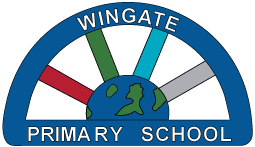Phonics
At Wingate Primary School, reading is at the heart of our curriculum. We believe that reading is a vital life skill that supports children’s learning across the whole curriculum. High quality phonics teaching is at the heart of early education, securing the crucial skills of word recognition that, once mastered, enable children to read fluently and automatically. Once children are fluent readers, they are able to concentrate on the meaning of the text and make the shift between learning to read and reading to learn.
By immersing our children in quality texts, we strive to ensure that our children are fluent readers with excellent comprehension skills. We provide a curriculum which is language rich in order to open doors for our children’s futures. It is our intention to ensure that by the end of their primary education, all pupils are able to read fluently, and with confidence, in any subject. We therefore encourage all pupils to read widely across fiction, non-fiction and poetry to develop knowledge of themselves and the world in which they live, to gain knowledge across the curriculum and to instil a love of reading and promote lifelong learning.

The systematic teaching of phonics has a high priority throughout Reception and Key Stage 1. At Wingate Primary School we follow the Bug Club Phonics programme to teach phonics. We aim to ensure that all children are fluent readers by the time they leave KS1 and have a love and enjoyment of reading. All adults in school have attended training on the delivery of Bug Club Phonics. Our reading scheme in Reception and Year One is entirely decodable using the Bug Club scheme. Bug Club Phonics is a comprehensive phonics teaching programme centred around an accessible and inclusive teaching approach. It is designed to build children’s confidence and enjoyment of reading at the very start of their reading journey.
The Bug Club Phonics teaching programme follows this structure.

Children are taught within their class and any additional support required is delivered in small groups. Within Early Years and Key Stage 1 classes, phonics is taught discreetly in a daily session that lasts up to one hour. Children then apply their new skills when reading books from the Bug Club scheme which match the letters and sounds that they have previously learnt.
Teachers draw upon observations and continuous assessment to ensure children are challenged and to identify children who may need additional support. Timely intervention is planned for those children who are working below expected levels as soon as their needs are identified.
In Year One, children build upon the phonic knowledge acquired in Early Years and further develop their segmenting and blending of more complex words based on their reading ability. When children move beyond Phase 5 phonics and a predominantly phonics approach to reading, then children are taught a broader range of reading skills to develop their understanding of the texts they read. Throughout Key Stage Two the teaching of phonics will continue as deemed necessary and in line with each child’s stage of development, with the expectation that all children will become fluent readers secure in word building and recognition skills.
All children are encouraged to read at home with an adult on a regular basis. Children have access to books matched to their phonic/reading ability until children become fluent readers. Through the engaging online reading world, which strengthens home school links, children can also access allocated, levelled Bug Club eBooks online to read both at school and at home. Children in Reception take Phonics homework home each week linked to the sounds they have learned in class to practise the recognition and writing of the letter and its sound.
Consistency of time and resources are applied effectively to support the teaching of daily phonics. The discrete teaching of phonics and reading has become a natural and everyday part of every aspect of the curriculum.


